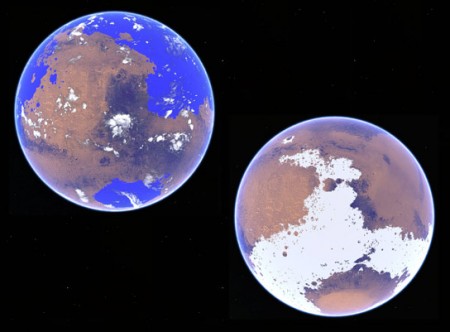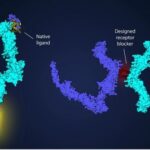June 19, 2015 – For sometime now as robot rovers and Martian orbiters study the geology of our neighbouring planet we have learned about its past. Mars some 4 billion or more years ago may have been warm and wet with an ocean covering much of the planet’s northern hemisphere. This Martian image is one that has gained popularity but it may be totally wrong according to a new research paper that reinterprets the data we have been collecting.
Entitled “Comparison of ‘warm and wet’ and ‘cold and icy’ scenarios for early Mars in a 3D climate model” the article appears in the Journal of Geophysical Research this month. Using a comparative climate modeling tool the authors argue that the evidence supports a “cold and icy” Mars, and not the one that is popularly depicted. Robin Wordsworth, Assistant Professor of Environmental Science and Engineering at Harvard University is one of the creators of the model that produces a 3-dimensional representation of Mars going back 3 to 4 billion years. The authors describe how they plugged in a “warm and wet” scenario with Mars having an average temperature of 10 Celsius (50 Fahrenheit) degrees, and one where the average temperature was -48 Celsius (-54 Fahrenheit).
They concluded based on looking at water erosion features, the amount of solar energy that Mars receives, and the constitution of the planet’s atmosphere, that the icy scenario was far more likely to be accurate. Mars today receives 43% of the solar energy that falls on Earth. Mars 4 billion years ago would have received even less solar energy from a younger and dimmer Sun. The estimate is a mere 25%. That alone makes it far more likely that Mars in its orbital location which probably has not altered much in the last 4 billion years, was cold and not warm and wet.
The authors state that to get a warm and wet Mars would require significantly different conditions than what is observed in the evidence today. That Mars would have had a thicker atmosphere with clouds to provide a greenhouse effect. An inclination of Mars axis tilted so that the Northern Hemisphere received the majority of solar energy might have created a warmer planet. The authors believe such a tilt could explain equatorial erosion features seen today. But other evidence negates this. For example there is little to be found on the flanks of Martian volcanoes that suggests a warm and wet past. If this were true we should see drainage and erosion patterns that show how water or the lack of it fashioned both the windward and leeward sides. But that evidence doesn’t exist.
Instead the authors show how icy fits with the valley networks and erosional features we see continuing on the planet today. Subsurface icy water releases can explain much of what we see. But what about the evidence of past lakes? The authors don’t argue that the lakes never existed. Instead they ask for how long and the periodicity of their appearances.
An icy Mars scenario doesn’t explain all erosion and drainage features we see on Mars today. The valleys that resemble those here on Earth we know were carved by ice contain no visible ice today. So what would explain the disappearance? The authors speculate that there were periods in Mars’ past where volcanic eruptions and meteor impacts could have temporarily boosted atmospheric temperatures, and that would have melted the ice from the valleys we see today.
It would be nice to think that Mars had a warm and wet past, a place where life could have got started, and that the planet could have been the birth place of life in our Solar System. But it appears if this new climate model is shown to be an accurate depiction of the Martian past, we may never find evidence of life on the planet.








